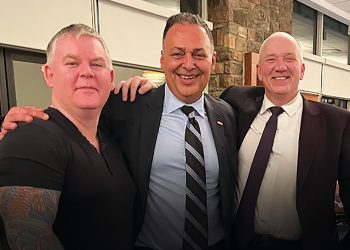RISMEDIA, August 20, 2010—Despite all the hopeful talk of “recovery,” it seems clear that Corporate America is stuck in the recession muck and can’t pull itself out. We’re trying to survive the “new normal”—working twice as hard for the same (or worse) results—and at many companies, the anxiety is almost palpable. Yes, employees are in a funk and, not surprisingly, their performance is suffering. Most managers get the connection. But we’re so busy racing through the day we can’t slow down to worry about little things like how employees feel.
And that, says bestselling author Jon Gordon, is the heart of the problem. How employees feel collectively adds up to culture, and culture isn’t a “little thing” at all. It’s what will ultimately pull your company out of its slump—or not.
“Here’s what happened,” explains Gordon, author of Soup: A Recipe to Nourish Your Team and Culture (Wiley, May 2010, ISBN: 978-0-4704878-4-6, $22.95, www.Soup11.com). “For years, managers were focused on the numbers, and the numbers were good. So morale was up and everyone was happy. But then the recession hit and the numbers went down. Well, when you’re focused on numbers and they’re going down, morale also goes down. So does engagement—and so does performance.
“This has thrown managers into a quandary,” he adds. “They’ve always led by the numbers, and it’s not working anymore. Trying to meet the same numbers and not succeeding only creates fear. They need to change their leadership focus, and most of them don’t know where to begin.”
The new focus, explains Gordon, should be on culture. It should be on purpose, morale and loyalty. And all of that boils down to two words: engaged relationships.
“Engaged relationships are interactive, collaborative and meaningful,” he says. “They are also essential: To effectively lead, coach, work with, or live with someone, you must truly know and have a strong bond with them. No matter how busy you are, you’re not too busy to create these bonds. You can’t afford to be that busy.”
In Soup—written in a fun, business fable format much like his international bestseller The Energy Bus and several other titles—Gordon explains the connection between engaged relationships and success and lays out the ingredients that make up a nourishing culture. The people “stirring the pot” have a powerful and lasting impact, he says…and if you’re a mid-level manager, that means you.
He offers a few key insights on building engaged relationships:
• Busyness and stress are a manager’s two worst enemies. They sabotage our efforts to build engaged relationships. With projects to complete, to-do lists to accomplish, goals to hit, and outcomes to achieve, life can feel like we are on a runaway bus in the movie Speed, says Gordon. We’re driving through life at 100 miles per hour and instead of taking the time to get people on our bus, we run them over. We become so focused on creating success that we don’t make the time to develop the relationships that lead to true success.
“In times of busyness and stress, the brain goes into survival mode and we stop thinking about serving other people, mentoring them, and helping them thrive,” he says. “This is where we drop the ball. Just when we need to be the most engaging, we become the least engaging. What our employees need the most, we’re delivering the least. And so the problems grow and multiply. It’s a perpetual cycle.”
• Where there’s a void in communication, negativity fills it. Recovery or no recovery, these are uncertain times. Employees are wondering what’s going to happen next, whether their job will be impacted, what action to take. That uncertainty creates a void. Unless you, the manager, fill the void with clear and positive communication, people will assume the worst. Fear and negativity will creep in and dominate their thoughts, behaviors, and actions.
“The number one thing a manager can do during times of uncertainty is to communicate,” asserts Gordon. “Communicate with transparency, authenticity, and clarity. Even when the news is not so positive, you can communicate it positively: Tell the truth, give them a plan, and help them believe, ‘Hey, we can turn this thing around.’ Optimism is a competitive advantage right now, and you need to convey it in all you say and do.”
• Employees need nourishment in order to thrive. These may seem like strange words to apply to the workplace. But Gordon insists they are spot on. He says the main question every employee in every organization wants to know is, “Do you care about me; can I trust you?” If your answer is yes, they will be more likely to stay on the bus and work with you. Employees who feel cared for, honored and nourished are more engaged in what they’re doing and will work at their highest potential.
“Learn to view your employees like a family—a functional family,” he clarifies. “This will change the way you treat them. You’ll see them as people who deserve your trust and love and who require communication, transparency, and authenticity from you. You want to be someone they can trust, and therefore you take the actions necessary to earn it.”
Admittedly, all this talk of engaged relationships and nourishment sounds appealing. But can any self-respecting manager really ignore the numbers?
Well, no, says Gordon. Of course you’ll still measure the numbers. They are, after all, the indicators of success in your business. Just measure them knowing they are simply a byproduct of your culture, leadership, morale, employee engagement, and ability to execute.
“Remind yourself every day that it’s not the numbers that drive people, but people and relationships that drive numbers,” he says. “Leaders get so busy trying to achieve success that they forget to take the time to develop the relationships that lead to success. But trying to build a winning team without great relationships is like trying to build a house on sand. It won’t stand. Relationships are the rock that creates the foundation upon which winning teams are built.”
About the Author:
Jon Gordon is a consultant, keynote speaker, and the international bestselling author of Soup, The Energy Bus, The No Complaining Rule, and Training Camp, all from Wiley. He and his books have been featured on CNN and on NBC’s Today show, as well as in Forbes, Fast Company, O, The Oprah Magazine, the Wall Street Journal, and the New York Times. Jon’s principles have been put to the test by NFL football teams and Fortune 500 companies alike. He has worked with such clients as the Atlanta Falcons, the PGA Tour, Northwestern Mutual, JPMorgan Chase, and Publix Supermarkets. A graduate of Cornell University, he holds a master’s degree in teaching and works with numerous businesses, professional sports teams, schools, universities, and nonprofit organizations. For more information, visit: www.JonGordon.com.










